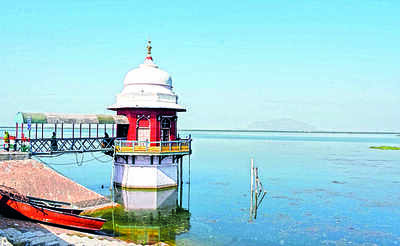Top Searches
- News
- City News
- vadodara News
- MSU to help VMC get rid of aquatic weeds from Ajwa lake
MSU to help VMC get rid of aquatic weeds from Ajwa lake

Vadodara: M S University will provide a permanent solution to Vadodara Municipal Corporation (VMC) which is struggling with the menace of aquatic weeds that cover Ajwa lake, the main source of drinking water for the city.
The Department of Environmental Studies at MSU has started a project whereby the phenomenal rise of aquatic weeds at Ajwa lake will be studied with the aim to provide a remedy to the corporation.
Currently, VMC gets the aquatic weeds manually removed from the lake using draggers, a massive task considering the stretch of the lake that is spread over 16 sq km area. The civic body gets 150 million litres per day (MLD) water from the lake which is supplied to 6-7 lakh citizens of Vadodara city.
“Generally, the presence of nitrate and phosphate acts as a catalyst for the growth of aquatic weeds in water bodies. We believe that since Ajwa lake is surrounded by agriculture fields, the agricultural run-off increases the presence of nitrate and phosphate in Ajwa lake reservoir because of which we are seeing a rise in aquatic weeds,” said Dr Ankita Upadhyay, assistant professor, who along with department head professor P Padmaja is working on the project.
“There are chemical weedicides that are available but since Ajwa lake is the main source of drinking water for Vadodara city, we cannot use chemicals for removing the aquatic weeds,” she said.
“Through the project, we will carry out water quality analysis of Ajwa water, map seasonal variations, identify the aquatic weeds, carry out chemical analysis of the soil as well as bacteriological analysis,” Upadhyay said.
According to research, aquatic weeds grow in monsoon and winter. “The water in Ajwa lake comes from Pratappura Sarovar. Currently, since the water from Ajwa reservoir is filtered at the Nimeta filtration plant before it is supplied to the city, so drinking water from Ajwa is not a problem. But we need to find a permanent remedy,” she said.
The researchers are also suggesting that the peripheral region of Ajwa lake should be closed so that agricultural run-off does not enter the lake.
The Department of Environmental Studies at MSU has started a project whereby the phenomenal rise of aquatic weeds at Ajwa lake will be studied with the aim to provide a remedy to the corporation.
Currently, VMC gets the aquatic weeds manually removed from the lake using draggers, a massive task considering the stretch of the lake that is spread over 16 sq km area. The civic body gets 150 million litres per day (MLD) water from the lake which is supplied to 6-7 lakh citizens of Vadodara city.
“Generally, the presence of nitrate and phosphate acts as a catalyst for the growth of aquatic weeds in water bodies. We believe that since Ajwa lake is surrounded by agriculture fields, the agricultural run-off increases the presence of nitrate and phosphate in Ajwa lake reservoir because of which we are seeing a rise in aquatic weeds,” said Dr Ankita Upadhyay, assistant professor, who along with department head professor P Padmaja is working on the project.
“There are chemical weedicides that are available but since Ajwa lake is the main source of drinking water for Vadodara city, we cannot use chemicals for removing the aquatic weeds,” she said.
“Through the project, we will carry out water quality analysis of Ajwa water, map seasonal variations, identify the aquatic weeds, carry out chemical analysis of the soil as well as bacteriological analysis,” Upadhyay said.
According to research, aquatic weeds grow in monsoon and winter. “The water in Ajwa lake comes from Pratappura Sarovar. Currently, since the water from Ajwa reservoir is filtered at the Nimeta filtration plant before it is supplied to the city, so drinking water from Ajwa is not a problem. But we need to find a permanent remedy,” she said.
The researchers are also suggesting that the peripheral region of Ajwa lake should be closed so that agricultural run-off does not enter the lake.

About the Author
Prashant RuperaPrashant Rupera is special correspondent at The Times of India, Vadodara and reports on politics, business, heritage, and education. He has been regularly reporting on the dairy sector in Gujarat which pioneered the White Revolution in the country. His interests include reading, watching movies and spending time with family and friends.
Start a Conversation
FOLLOW US ON SOCIAL MEDIA
FacebookTwitterInstagramKOO APPYOUTUBE









